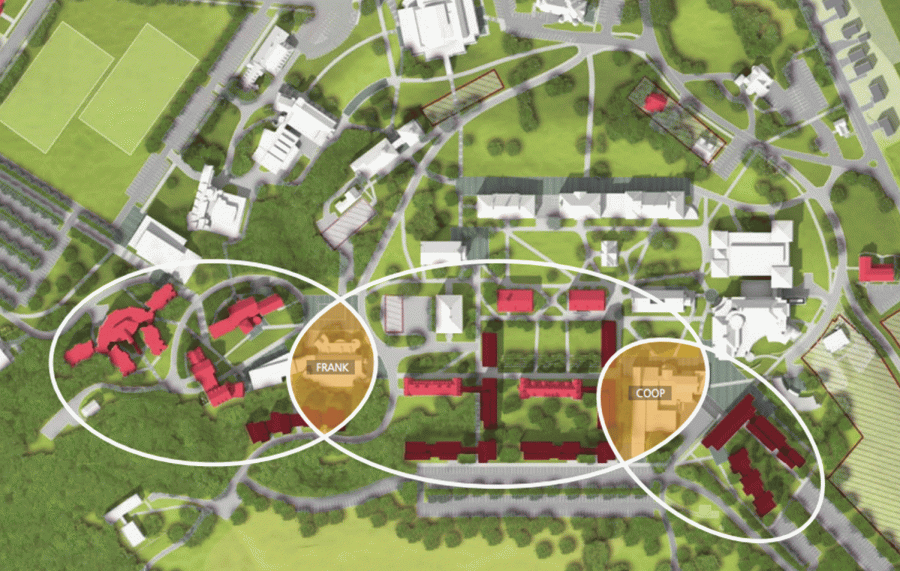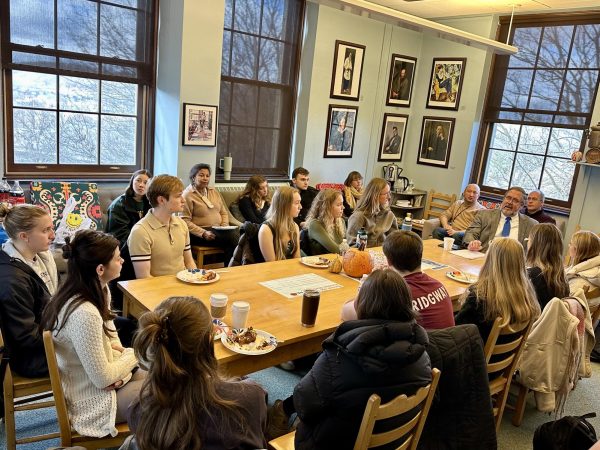Residential Living Communities to be Implemented Fall 2015
Starting in the fall of 2015, Colgate University will begin the first steps toward fully enacting its Living the Liberal Arts Initiative. Outlined in “Colgate University’s Strategic Plan, 2014-2019: Living the Liberal Arts in our Third Century” are the processes by which Colgate will roll out the initiative. On October 31, Provost and Dean of the Faculty Douglas Hicks sent out an e-mail to the Colgate community announcing the faculty directors who will lead the residential learning communities, a key component of the initiative and strategic plan.
The first residential community will be opened next fall and will be led by University Chaplain and Catholic Campus Minister Mark Shiner and Professor of Psychology and Presidential Scholar Rebecca Shiner. Students within this residential living community will be comprised of select members of the Class of 2018 and the incoming Class of 2019. They will live in the Curtis Hall and Drake Hall dormitories. Following the opening of the first community, a new residential living community will open every year, phasing in this major element of the Living the Liberal Arts Initiative. The process by which students will opt into the residential living communities has yet to be determined.
The Shiners maintained that the students living and participating in the community will play a large part in crafting the individual characteristics of next year’s first residential living community.
“I think that the character of the group is going to be formed by the group of people who live there…That’s the hope, that the people who live here will be excited about this opportunity and will value playing a founding role in establishing the character and practices of the house,” Professor Shiner said.
A main feature of the residential living communities will be the introduction of a Broad Street annex for each of the new communities. This annex will function as a social space for all the students affiliated with a certain residential living community.
“People will have a choice about the extent to which they will be involved over time, but the annex is being offered as place that people can be part of for all four years. The Broad Street annex is designed to be a place where the upper class students affiliated with the community can develop a connection with the younger students who are a part of their house,” Professor Shiner said.
Mark Shiner was careful to explain that introduction of this new way for students to affiliate themselves with other members of the Colgate community is not an attempt by the administration to permanently eradicate Greek life on campus.
“All of those things [including Greek life] are still possible. It’s not like by being part of one you limit your ability to be a part of another. But what is true is that you always have that connection. And as the program unfolds, the Broad Street annex will always be a place where you can opt into and participate in the social events,” Deacon Shiner said.
Rather than being an alternative that will eventually overtake Greek life, the residential living communities are being created in the hope of creating a more supportive and inclusive campus identity.
“Greek life provides some really incredibly useful things to our students, and a lot of really fantastic people are a part of Greek life…But at the same time, most people will acknowledge that there are cultural problems that need to be addressed by Colgate as a whole, for example, people feeling excluded and marginalized on campus because of their race, social status or other differences. I’d hope that we can create a situation where the events that are happening in the annexes are fun and are structured in such a way that everyone will have a place to go and feel at home,” Deacon Shiner said.
The goal of the Living the Liberal Arts Initiative is to create a Colgate community that is easily accessible to all students who step foot on campus.
“What I think is important is to understand that the University really cares about each and every student that we’re bringing into the organization. I think for every student we want to make sure that we’re providing the safest and best environment for them to learn and really thrive, because basically that continues a sense of fostering a positive and strong alumni community,” Assistant Dean of Admission John Paul Ortiz said.
Another key feature of the Living the Liberal Arts Initiative is that it will provide more opportunities for students to connect with the faculty and staff at Colgate. One of the main goals of the initiative is to foster connections between all members of the Colgate community. It is the hope of the administration that these residential living communities will help to facilitate productive relationships among individuals at Colgate.
“The important thing to realize is that, even if we do the best job we can do, we’re not going to fix everything. Neither of us nor anybody in the group is inclined toward utopian ideas, but we’re hoping that restructuring things to make it so that there’s a greater connectedness across generations, between older and younger students, will allow us to make progress on some of the difficult campus issues,” Deacon Shiner said.
Overall, the administration and the individuals involved in this initiative are optimistic about the future of the university as they more fully take students’ voices and needs into account.
“We’re really eager for students to step forward if they’re interested in building something from scratch, building something new. I think it’s a really exciting opportunity because the students involved can really feel like they’re having an impact. So many of the big decisions have yet to be made,” Professor Shiner said.






